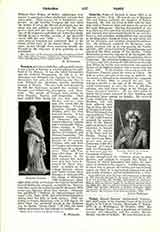

Tancred, Prince of Antioch, b. about 1072; d. at Antioch, December 12, 1112. He was the son of Marquess Odo and Emma, probably the daughter of Robert Guiscard. He took the Cross in 1096 with the Norman lords of Southern Italy and joined the service of his uncle Bohemund. Having disembarked at Arlona (Epirus), they marched towards Constantinople, and Tancred soon attracted attention by his activity, bravery, and somewhat undisciplined zeal; according to his biographer, Raoul de Caen, he was noted also for his humanity and kindness towards the defenseless. He brilliantly repulsed the Byzantine army which attacked him as he was crossing the Vardar (February 28, 1097), from which time Tancred became and remained the bitter enemy of the Greeks. Unlike Bohemund, he was the only one of all the leaders who refused to take the oath of fidelity demanded by Alexis Comnenus. He played an important part in the siege of Nicaea, and later, during the difficult march through Asia Minor, he led the way southwards and captured Tarsus which Baldwin tried in vain to wrest from him (September, 1097). While Baldwin advanced towards the Euphrates, Tancred seized the towns of Cilicia. He took an active part also in the siege of Antioch. In the march on Jerusalem he commanded the vanguard, and on July 15, 1099, he entered the city, after making a breach in the gate of St. Stephen. He vainly endeavored to save the lives of 300 Mussulmans who had taken refuge in the Mosque of Omar (Templum Domini). On the other hand he looted the treasures amassed in that building and distributed them among his knights. He received from Godfrey de Bouillon, who had been selected over him as king, the fiefs of Tiberias and Caïfa. When Bohemund was captured by the Turks in July, 1100, Tancred assumed the government of the Principality of Antioch, and extended its boundaries at the expense of the Turks and the Greeks. During the war between Bohemund and Alexis Comnenus (1104-08), Tancred defended both the Principality of Antioch and the Countship of Edessa; he also strengthened the Christian power in those districts, and refused to recognize the Treaty of Durazzo by which Bohemund had ceded the suzerainty of Antioch to the emperor. A skilled politician, he knew how to placate the Greeks and issued Greek money on which he is represented adorned with gold and jewels, wearing a turban surmounted by a cross.
LOUIS BREHIER

